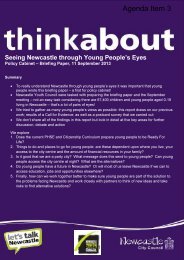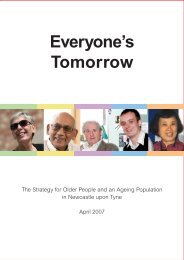NEWCASTLE'S MUSICAL HERITAGE AN INTRODUCTION By ...
NEWCASTLE'S MUSICAL HERITAGE AN INTRODUCTION By ...
NEWCASTLE'S MUSICAL HERITAGE AN INTRODUCTION By ...
You also want an ePaper? Increase the reach of your titles
YUMPU automatically turns print PDFs into web optimized ePapers that Google loves.
Conservatoire, composing and music in general – he was a pedagogue and<br />
probably did not want to get involved in musical politics. Rea and Bainton. were<br />
both, technically speaking, outsiders, who were not committed to the town other<br />
than through their respective appointments but more surprising is the case of<br />
William Gillies Whittaker. He was a Tynesider and one of its key musical figures<br />
with a lot to offer but he deserted the town for a musical appointment in Glasgow.<br />
All of these musicians were essential to the musical life of the town and their<br />
departure (William Rea in fact retired and died soon after) created a vacuum<br />
which was never filled.<br />
Charles Avison did not have to worry about competition from visiting<br />
orchestras and their effect on local musicians, but one hundred years later the<br />
town was playing host to a number of visiting symphony orchestras. Newcastle<br />
welcomed these touring musicians but in doing so was it making a mistake. In<br />
Birmingham for instance during its orchestra’s formative years the professional<br />
musicians in the town objected strongly to outsiders being invited in on the basis<br />
that it weakened their argument that what the town needed was a permanent<br />
orchestra. There was also the threat to their livelihood to be considered. There<br />
were literally hundreds of musicians in Newcastle at the turn of the 20 th century<br />
but of what standard we do not really know. There would have been a core of<br />
professionals, but the majority would have been amateurs. Newcastle had never<br />
had an influx of Continental musicians, as was the case in Manchester, Liverpool<br />
and Leeds for instance and even Dan Godfrey started with an Italian band in<br />
Bournemouth. These Continentals brought their culture and high playing<br />
standards with them and stood up for their profession but in Newcastle the<br />
amateur tradition in music thrived and whilst amateurism had always been part of<br />
English tradition it did not help build first rate professional orchestras. Judging<br />
only by the names of orchestral players printed in historic programmes for<br />
concerts in Newcastle by local musicians I would say that the vast majority of<br />
them were of English origin and more than likely, locals. From this I can only<br />
draw the conclusion that the general standard of playing was probably not very<br />
high. Quality orchestral musicians could have been invited into the town to boost<br />
the standard of a local orchestra, as they had been on festival occasions, but the<br />
town would have had to show some commitment which never appears to have<br />
been the case. Nor does there seem to have been any compulsion on the part of<br />
Newcastle musicians to establish some sort of artistic integrity and authority<br />
within the town.<br />
It is one of life’s ironies to discover that Newcastle had at the turn of the<br />
century within its midst a ‘Dan Godfrey’ of its own. His name was H.G.Amers<br />
(see also chapter eleven). Amers and Godfrey were so alike as to be able to<br />
draw direct comparisons. They both came from well known musical families, they<br />
were both disciplined musicians in the Military Band style and they were both<br />
capable of taking a band of half decent musicians and moulding them into a fine<br />
orchestral band. They both made their names at English Spa Resorts building up<br />
a local musical culture that became a magnet for all the leading musicians in the<br />
108

















